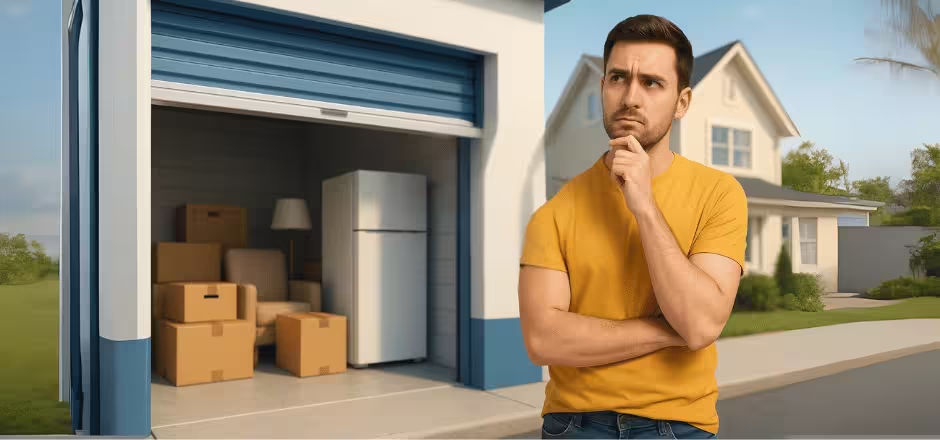Putting your valuables in a self-storage unit can be an intelligent choice during a move, renovation, or space crunch—are they insured against theft and damage? This question becomes cardinal: Does homeowners insurance cover self storage units? If you rely on your current policy for the protection of things stored outside the home, it is good to understand what you have coverage for and what you don’t and the limitations that may come.
In this blog, we will cover the topic of homeowners insurance coverage for self-storage units, including policy limits, filing claims, and specialty considerations—for example, does State Farm homeowners insurance cover self storage units?
What Is Covered by a Standard Homeowners Insurance Policy?
In effect, most standard Homeowners Insurance covers:
- Protection for the dwelling (structures of your home).
- Personal property (things or belongings you own).
- Protection against liability (in case someone gets injured on your property).
- Additional living expenses (in case your home cannot be lived in due to covered damage).
Regarding Personal Property Claims, most policies cover objects even when they are off the premises. It would include belongings stored in a self-storage facility. However, such coverage usually entails somewhat lower limits, as well as some specific conditions.
Hence, does homeowners insurance cover self storage units fully? No, there are limits that one should thus understand.
Does Homeowners Insurance Cover Self-Storage Units? Find Important Limits
So, does State Farm homeowners insurance cover self storage units? Yes, they do, but only partially and not without plenty of conditions. Most insurers sell off-premises coverage, which includes protection for your personal belongings even when they are not inside your primary residence.
But the catch is that the coverage limit is generally 10%. For example, if your policy covers $100,000 for personal property, the off-premises limit would allow $10,000 for items in a storage unit.
Covered Perils for Storage Units
Items stored in a self-storage unit are usually protected from common hazards such as:
- Fire and smoke damage.
- Theft or vandalism.
- Windstorms and hail.
- Water damage from plumbing-related causes, but not floods.
- Explosion or lightning strikes.
But not all peril is covered. Floods, earthquakes, mold in the third degree, or vermin (think: rodents) are usually excluded, unless you buy extra riders or endorsements.
Does State Farm Homeowners Insurance Cover Self-Storage Units?
If you are wondering specifically, does State Farm homeowners insurance cover self storage units?—The answer is generally yes. Like many insurers, State Farm will provide limited coverage for personal items stored away from one’s home. However, inquire and confirm with a representative or review your policy on the precise limits and covered perils. Sometimes, the purchase of extra coverage would be a good idea.
How to File a Claim for Items in Storage
Filing a claim is among the few expected things that can be done for damages or theft in your home. The process is almost the same for self-storage units. Here’s what you should do:
Step 1: Assess the Damage or Loss
Inventory what’s missing or damaged. If it’s theft, file a police report immediately.
Step 2: Contact Your Insurance Company
Make a phone call to the insurance company and tell them about the incident. Give the insurer details about the loss and the date on which it occurred.
Step 3: Submit Proof of Ownership
Submit photographs, receipts, or other evidence that could establish the value of the items damaged or stolen.
Step 4: Wait for Evaluation and Payout
Your claims adjuster may want to visit the storage unit or perhaps request further documentation before clearing you for payout.
Remember, there is a deductible, and the final payout depends on the limit of your coverage, especially regarding off-premises storage.
Frequently Asked Questions (FAQs)
1. Does homeowners insurance cover self storage units?
Damage caused by theft, fire, or windstorms is covered by homeowners’ insurance in storage units. It cannot, on the other hand, protect against flooding, earthquake, or pest damage, to name a few.
2. How much coverage do I get for items in a self-storage unit?
An average homeowners’ insurance policy gives 10% of the personal property value for off-premises storage.
3. Does State Farm homeowners insurance cover self storage units?
Yes, it does cover self-storage units with off-premises personal property protection; however, there are limits and conditions, so do check your policy.
4. Can I increase the storage unit coverage on my policy?
Yes, you may add endorsements or scheduled personal property riders to increase coverage for items of a very high value stored therein.
5. Should I get separate insurance for my storage unit?
If you have limited protection under your homeowners policy or if you are storing expensive items, it can be a good idea to buy separate storage insurance from the facility or an independent provider.
Not sure if your storage unit is fully covered? Review your homeowners policy, ask your insurer about storage coverage, and protect your belongings today! For any query, reach USInsurance247.

